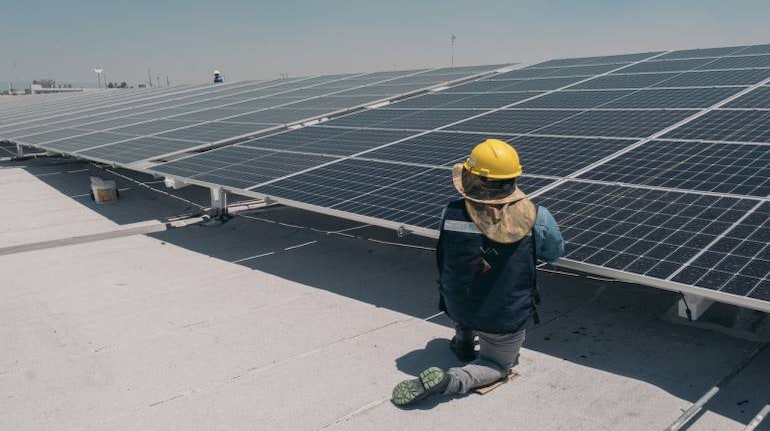



The Ministry of New and Renewable Energy (MNRE) has issued an order reimposing the Approved List of Models and Manufacturers (ALMM) for supply of solar photovoltaic (PV) modules to government projects from April 1, 2024. The ALMM mandate aims to boost domestic solar module manufacturers.
As per the MNRE order, projects that are at an advanced stage of construction and where the order for solar modules is placed before March 31, 2024 will, however, be exempted from the mandate.
Moneycontrol was the first to report on December 7, 2023 that the government planned to implement the ALMM norms from April.
On January 16, Union minister for power and new and renewable energy, RK Singh, said the mandate would be re-imposed, but with certain relaxations.
“That the plant is in advanced stages of construction and the irrevocable letter of credit (LC) has been opened before March 31, 2024, will be subject to verification,” read the MNRE order dated February 9. Moneycontrol has a copy of the order.
Also read: Pradhan Mantri Suryoday Yojna: Houses consuming up to 300 units to get rooftop solar freeThe ALMM mandate was introduced in 2021 as a non-tariff barrier to boost domestic production by approving a list of indigenous models and manufacturers eligible to supply solar development projects put out by the government. The mandate was extended to the government’s open-access projects as well. Currently, 72 Indian manufacturers are on the list.
However, in March 2023, the government kept the ALMM in abeyance for a year, saying it would not apply to any solar project commissioned before March 31, 2024. The government said the ALMM mandate was kept in abeyance to boost solar project installations in India, which had suffered sluggish growth, first due to the COVID-19 pandemic and then due to the imposition of basic customs duty.
Also read: Government's power sector schemes get 50% higher funds in Budget 2024The latest MNRE order also stated that the ALMM will apply only to those projects that are sponsored or subsidised by the government. “ALMM will apply to government or its agencies procuring power for its own consumption or for distribution to the people through distribution companies,” the order stated.
Besides, ALMM will also apply to solar PV rooftops and PM KUSUM schemes, which are subsidised. “The ALMM will not apply to projects set up under open access or as captive by private parties. In other words, ALMM will not be applicable for people who set up their own capacity,” read the order.
Positive for local OEMsGirishkumar Kadam, Senior Vice President and Group Head, Corporate Ratings, ICRA Limited, said the reimposition of ALMM is a positive decision for domestic original equipment manufacturers (OEMs). “The scale-up in domestic module manufacturing capacity over the past 12 months is expected to improve the availability of modules from domestic OEMs,” he said.
“However, the sector would remain dependent on imports for solar PV cells and wafers, given the limited cell manufacturing capacity and lack of wafer capacity in India. In this context, setting up fully integrated units awarded under the production-linked incentive (PLI) scheme remains important to reduce dependence on imports,” Kadam added.
But imports are still cheaperFrom the independent power producers’ (IPPs) perspective, the earlier order exempted projects scheduled for commissioning from the ALMM requirement till March 31, 2024. “Also, the order allows exemption from ALMM for open access-based and captive solar projects, enabling these projects to source modules from the most cost-competitive sources,” said Kadam. “Based on the prevailing cost of imported solar PV cells and modules, the sourcing of imported modules is relatively cheaper than the cost of sourcing modules from domestic OEMs after accounting for the import duties.”
Boosted by production-linked incentive (PLI) schemes, India’s domestic solar module manufacturing capacity is expected to reach 95-100 GW by 2026. Under the second tranche of the PLI scheme, the green power arms of Reliance Industries, Tata Power Company, and JSW Energy are setting up solar photovoltaic (PV) module manufacturing capacities.
Discover the latest Business News, Sensex, and Nifty updates. Obtain Personal Finance insights, tax queries, and expert opinions on Moneycontrol or download the Moneycontrol App to stay updated!
Find the best of Al News in one place, specially curated for you every weekend.
Stay on top of the latest tech trends and biggest startup news.